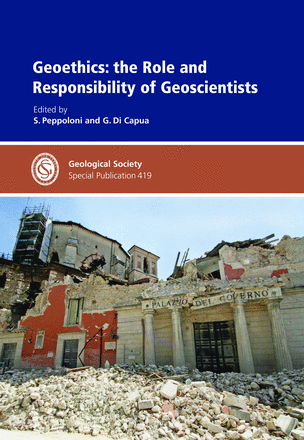
Peppoloni Silvia and Di Capua Giuseppe (Eds.)
Geoethics: the Role and Responsibility of Geoscientists
2015, Geological Society, London, Special Publications, 419, ISBN 978-1-86239-726-2
Title description
This Special Publication will be an important tool for geoscientists, aimed at increasing the awareness of their societal role and responsibility in conducting education, research and practice activities. What are the responsibilities of a geoscientist ? And what motivations are needed to push geoscientists to practice the Earth sciences in an ethical way? The major environmental challenges affecting human communities require not only a strictly scientific and technical preparation by the geoscientists, but also a reflection on their broader obligations towards society. It is important that geoscientists consider geoethics as an indispensable framework on which to base their training and activity. The principles of geoethics can guide them to pursue the common good by weighing the benefits and costs of each choice, and identifying eco-friendly and society-friendly solutions that guarantee the respect of the right balance between human life and the dynamics of the Earth. Communication and dissemination of geosciences should become core activities in building a knowledge-based society, which is able better to protect itself and the Earth ecosystems in order to guarantee a life in harmony with our planet for future generations.
Chapters
PEPPOLONI, S. & DI CAPUA, G.
Ethics in geosciences
BOHLE, M.
Simple geoethics: an essay on daily Earth science
LIMAYE, S. D.
A geoethical approach to industrial development of georesources and groundwater use: the Indian experience
DATTA, P. S.
Ethics to protect groundwater from depletion in India
ALLAN, M.
Geotourism: an opportunity to enhance geoethics and boost geoheritage appreciation
BROCX, M. & SEMENIUK, V.
The development of solar salt ponds along the Pilbara Coast, Western Australia – a coastline of global geoheritage significance used for industrial purposes
Geoethics and natural risks
COCCO, M., CULTRERA, G., AMATO, A., BRAUN, T., CERASE, A., MARGHERITI, L., BONACCORSO, A., DEMARTIN, M., DE MARTINI, P. M., GALADINI, F., MELETTI, C., NOSTRO, C., PACOR, F., PANTOSTI, D., PONDRELLI, S., QUARENI, F. & TODESCO, M.
The L’Aquila trial (free download by June 2016)
PARKASH, S. Cooperation, coordination and team issues in disaster management: the need for a holistic and integrated approach
ACHARJEE, S.
Urban land use and geohazards in Itanagar, Arunachal Pradesh, India: the need for geotechnical intervention and geoethical policies in urban disaster resilience programmes in a changing climate
CRESCIMBENE, M., LA LONGA, F., CAMASSI, R. & PINO, N. A.
The seismic risk perception questionnaire
KOSTYUCHENKO, Y. V. & MOVCHAN, D.
Quantitative parameter of risk perception: can we measure a geoethic and socio-economic component in disaster vulnerability?
DE PASCALE, F., BERNARDO, M., MUTO, F. & TRIPODI, V.
Geoethics and seismic risk perception: the case of the Pollino area, Calabria, southern Italy and comparison with communities of the past
DE RUBEIS, V., SBARRA, P., SEBASTE, B. & TOSI, P.
Earthquake ethics through scientific knowledge, historical memory and societal awareness: the experience of direct Internet information
Geoethics and the communication of science
ALBARELLO, D.
Communicating uncertainty: managing the inherent probabilistic character of hazard estimates
SOLARINO, S.
How to strengthen public trust in geosciences
MARONE, E., CAMARGO, R. & SALCEDO-CASTRO, J.
Communicating natural hazards: marine extreme events and the importance of variability and forecast errors
VECCHIA, P.
The oil and gas industry: the challenge for proper dissemination of knowledge
Geoethics and geoeducation
SILVA, E., SA´ , A. A. & ROXO, M. J.
From planet Earth to society: a new dynamic in Portugal concerning geoscience education and outreach activities
FERRERO, E. & MAGAGNA, A.
Natural hazards and geological heritage in Earth science education projects
RUBBIA, G., D’ADDEZIO, G., MARSILI, A. & CAROSI, A.
Science and scientists from a child’s point of view: an overview from drawings
PIANGIAMORE, G. L., MUSACCHIO, G. & PINO, N. A.
Natural hazards revealed to children: the other side of prevention
